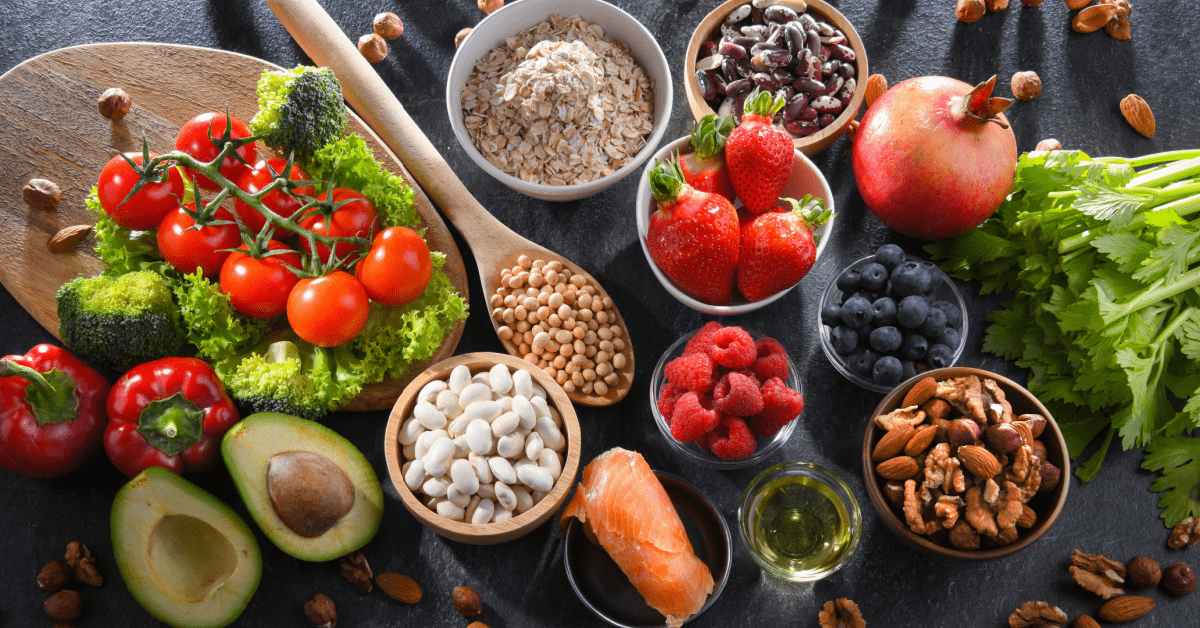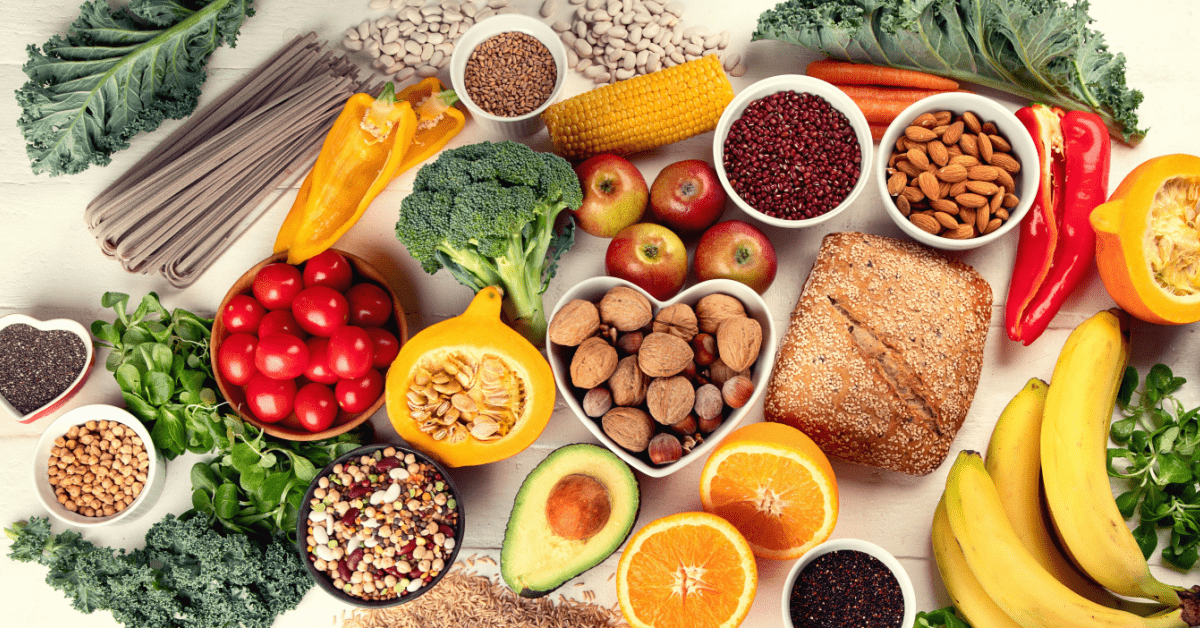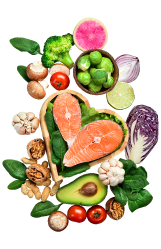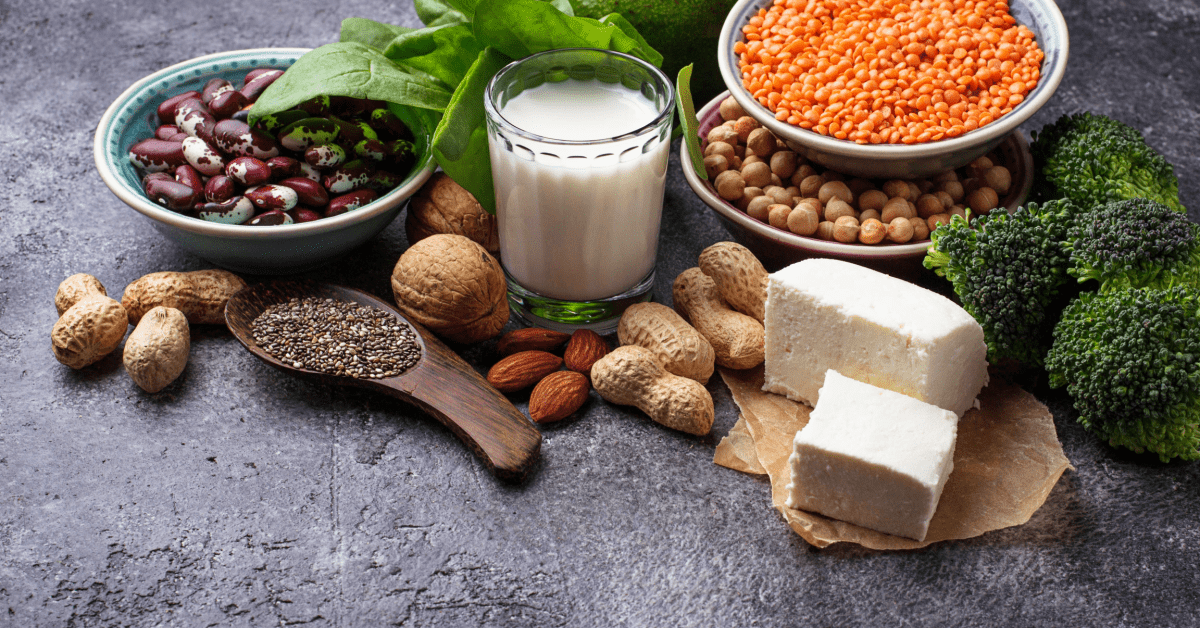Did you know that nearly 25 million adults in the United States have total cholesterol levels above 240 mg/dL?
Managing your cholesterol is crucial for your heart health and overall well-being. Lifestyle changes are essential for maintaining normal cholesterol levels. Losing weight, eating a cholesterol-lowering diet, exercising regularly, quitting smoking, and limiting alcohol intake can all improve cholesterol levels.

Master your heart health now
Take part in our 60sec quiz and get a heart health plan tailored just for you.
Contents
One of the best ways to lower your cholesterol is to eat a heart-healthy diet. In this article, we will discuss the best nutritional choices to maintain normal cholesterol levels.
What You Need to Know About Cholesterol
Cholesterol is a waxy substance found in your blood, and your body needs it to build healthy cells. However, high cholesterol levels can increase your risk of heart disease.
There are two types of cholesterol: low-density lipoprotein (LDL), also known as “bad” cholesterol, and high-density lipoprotein (HDL), also known as “good” cholesterol. If you have too much LDL cholesterol in your body, it can build up on the walls of your blood vessels. The buildup is called “plaque,” and it can cause health problems, such as heart disease and stroke.
Begin regulating your cholesterol for better heart health!
Take this 60sec quiz to discover the best fit for you.

Unfortunately, high cholesterol shows no signs or symptoms, therefore the only way to know whether you have high cholesterol is to get it checked. This can be done by your healthcare provider doing a blood test called “lipid profile.”
Soluble Fiber-Rich Foods

Soluble fiber is an essential nutrient that helps with blood sugar levels, lowers cholesterol levels, and improves heart health. Foods rich in soluble fiber can help decrease or stop absorbing cholesterol into your bloodstream. Here’s a list of soluble fiber foods:
- Black, Lima, and Kidney beans
- Brussels sprouts
- Avocados
- Sweet potatoes
- Broccoli
- Pears and apples
- Carrots
- Flaxseeds and sunflower seeds
- Oats, oat bran
Omega-3 Fatty Acid-Rich Foods
Omega-3 fatty acids are a type of unsaturated fat that is good for your cholesterol levels. Other types of fat include saturated fats, which increase cholesterol levels. You should replace saturated fats with unsaturated fats for a healthy diet.
Omega-3 fats are important for hormones that help regulate blood clots, the function of artery walls, and inflammation. Due to this, Omega-3 can help lower heart disease risk.
Steer your heart in a healthier direction with nutrition!
Dive into our 60sec quiz to find your perfect nutritional fit.

However, unlike the other fats, the body cannot make these fats itself, therefore they have to be consumed through food. Here’s a list of foods high in Omega-3 fatty acids:
- Fatty fish – salmon, sardines, anchovies
- Chia seeds
- Walnuts
- Soybeans and soybean oil
- Seafood – oysters, clams, shrimp
Plant Sterols and Stanols

Plant stanols and sterols are cholesterol-like compounds that are found naturally in a range of plant-based foods. Various studies have shown that sterols and stanols reduce blood cholesterol. They get in the way when the digestive system tries to absorb cholesterol. This way, the cholesterol leaves your body as a waste instead of going into your bloodstream. Here’s a list of foods rich in plant sterols and stanols:
- Fortified foods – margarine, yogurt
- Almonds, pistachios
- Sesame oil
- Whole grains – oats, barley
- Spinach
- Lentils
- Peas
Additional Cholesterol-Lowering Foods
In addition to the previously mentioned categories, various other foods and supplements lower your cholesterol. Here are some of them:
- Olive oil: Olive oil is a healthy monounsaturated fat that can help raise HDL cholesterol levels and reduce LDL cholesterol. It’s a key component of the heart-healthy Mediterranean diet.
- Garlic and lemon juice mixture: The combination of garlic and lemon juice has been linked to reduced LDL cholesterol levels.
- Berries: Berries like blueberries, strawberries, and raspberries are rich in antioxidants, which can help reduce LDL levels.
- Green tea: Green tea contains antioxidants called catechins, which may help reduce LDL cholesterol and improve heart health.
- Fiber-rich foods: Foods high in soluble fiber, such as psyllium husk, flaxseeds, and barley, can help reduce LDL cholesterol levels.
Remember that dietary changes should be part of an overall heart-healthy lifestyle, which includes regular physical activity, not smoking, and maintaining a healthy weight.
Additionally, it’s a good idea to consult with a healthcare professional or registered dietitian before making significant changes to your diet, especially if you have specific health concerns or are taking medications. They can provide personalized guidance based on your individual needs and health status.
If you’re looking for healthy recipes including all these ingredients, find some ideas here.
FAQ

Which foods are most effective in lowering cholesterol?
Foods that are most effective in reducing cholesterol levels typically include those that are high in soluble fiber, healthy fats, and compounds like plant sterols and stanols. Here are some of the most effective foods for reducing cholesterol:
- Oats
- Legumes – beans, lentils, chickpeas
- Fatty fish – salmon, sardines, anchovies
- Nuts – almonds, walnuts, pistachios
- Olive oil
- Whole grains – brown rice, quinoa, whole wheat products
- Avocado
How do plant sterols and stanols aid in cholesterol management?
Plant sterols and stanols are natural compounds found in certain plant-based foods. They can aid in cholesterol management by reducing the absorption of dietary cholesterol in the intestines, leading to reduced LDL cholesterol levels in the bloodstream. When incorporated into a heart-healthy diet, they can be a useful part of an overall strategy to improve cholesterol profiles and support cardiovascular health.
Are there any foods I should avoid to maintain healthy cholesterol levels?
Yes, to maintain optimal cholesterol levels, it’s important to limit or avoid certain foods that can contribute to elevated LDL cholesterol levels, often referred to as “bad” cholesterol. Here are some foods you should consider limiting or avoiding:
- Saturated and trans fats – fatty cuts of red meat, full-fat dairy products, palm oil and coconut oil
- High-cholesterol foods – liver, kidney meat, egg yolks
- Added sugar
- Processed and fast foods
- Highly refined grains
- Excessive alcohol
- High-sodium foods
Additionally, consider reducing portion sizes and practicing mindful eating to manage calorie intake and maintain a healthy weight, as excess weight can impact cholesterol levels and overall heart health. Consulting with a registered dietitian or healthcare provider can provide personalized guidance on dietary choices for cholesterol management.
Can dietary changes alone significantly lower cholesterol?
Yes, dietary changes alone can significantly lower your cholesterol.
However, it’s essential to note that the effectiveness of dietary changes in lowering cholesterol can vary from person to person. Genetics, underlying health conditions, and individual responses to specific foods all play a role. Additionally, the extent of cholesterol reduction achieved through dietary changes may differ. For some individuals, lifestyle changes alone may be sufficient, while others may require medication and dietary modifications.
To determine the most appropriate approach for your cholesterol management, it’s advisable to consult with a healthcare provider or registered dietitian. They can provide personalized guidance, monitor your progress, and make recommendations tailored to your specific needs and health goals.
Transform your heart health with
Cardi Health app!
Find out what works best for you with our 60sec quiz.

Conclusion
In summary, maintaining normal cholesterol levels is vital for overall well-being and heart health. Lifestyle changes, particularly dietary modifications, are important in achieving and sustaining optimal cholesterol levels.
Understanding the distinction between “good” HDL cholesterol and “bad” LDL cholesterol is essential, as high cholesterol often presents without symptoms, necessitating regular screenings.
Supplementing dietary changes with heart-healthy choices like olive oil, garlic, berries, and green tea can provide additional health benefits. Reducing added sugars, processed foods, and excessive sodium intake is crucial for cardiovascular health.
Dietary changes should be part of a broader heart-healthy lifestyle, including regular physical activity, maintaining a healthy weight, not smoking, and moderate alcohol consumption.
Individual responses to dietary changes vary, so consult healthcare professionals or registered dietitians for personalized recommendations, especially if you have specific health concerns or take medications.
These steps can significantly improve your cholesterol, reducing the risk of heart disease for a longer and healthier life.
If you want help managing healthy eating, consider using the Cardi Health app. It provides low-cholesterol recipes and helps you stay on track with your heart health goals.
Related articles
Does Caffeine Raise Blood Pressure?
Does Drinking Water Lower Blood Pressure?
Causes of High Blood Pressure at Night
10 DASH Diet Breakfasts for a Healthy Start
Heart-Healthy Diet Guide
What Should an 85-Year-Old Blood Pressure Be?
What is Normal Blood Pressure for a 70-Year-Old?
How to Read Blood Pressure: A Comprehensive Guide
Wearing a Heart Monitor for 2 Weeks: What You Need to Know
Manage your heart health now
Find out what works best for you with this 60sec quiz and get your personalized heart health plan.

